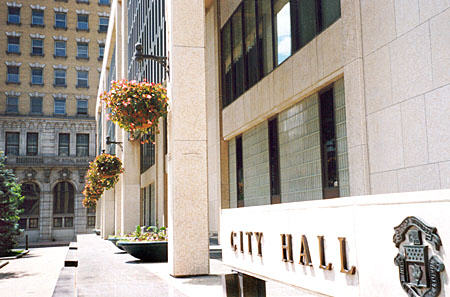Given the ongoing conflict of interest and real estate scandal that beleaguers Winnipeg Mayor Sam Katz, it is easy to forget that he was once a consensus-building maverick who wrested the mayoralty from a competitive field of candidates in 2004.
His experience in the private sector and cooperative attitude were attractive to voters craving a pivot away from old political divisions. For them, Katz seemed to embody the phrase “There is no political way to build a bridge.”
If you haven’t heard this expression in reference to city politics, you have at least heard the sentiment. It is the notion that, due to the nature of cities, municipal officials should transcend partisan bickering.
This philosophy originates from a long tradition of moderate mayors and councillors in small communities, who have found it politically useful for themselves to transcend partisanship. It has since turned into a dominant ideology that tells civic leaders to avoid political affiliation at all costs.
But too many people, particularly in Winnipeg, confuse city politics with some kind of roll-up-your-sleeves, post-partisan undertaking.
In reality, there are many ways to build a bridge; and all of them are political.
The Manitoba New Democrats have known this for quite some time, and have countered the philosophy on and off for decades by publicly endorsing candidates who are then permitted to use provincial party resources, like voters lists, but are not obligated to vote a certain way once elected.
This process, which involves a mixture of nomination votes and political deals, doesn’t resonate with voters outside of certain leftist, inner city constituencies. And, in the 2010 civic election, Winnipeg Mayor Sam Katz used the public’s suspicion of the process to handily defeat his opponent; former NDP MP Judy Wasylycia-Leis.
If elected, the mayor argued, Wasylycia-Leis and her council cohorts would be puppets for the provincial government. She would raise taxes, endorse the latest social democratic “strategies” and blindly pander to public sector unions.
Katz made this argument despite retaining close ties with the Manitoba Progressive Conservatives and despite clear evidence that the PCs also share electoral resources with like-minded municipal candidates.
The difference between the Tories and the Dippers, however, is that the former conduct their dirty politicking behind closed doors, while the latter openly flaunt it. In 2010, this resulted in a failed mayoral bid by a sympathetic candidate, major political tensions in two wards between council candidates vying for the party’s endorsement and unfounded allegations that the New Democrats had broken electoral finance rules to funnel money into a council campaign in Mynarski.
With Sam Katz gripped by a massive scandal that has hugely eroded public confidence, the NDP have a substantial opportunity in the 2014 election. But, given the disastrous 2010 results, they cannot continue to feebly endorse candidates in an environment where Winnipeggers are wary of a so-called “NDP take-over.”
If the party hopes to win City Hall, they have two options: either scrap their weak endorsement process and double-down on real municipal partisanship, or do what the public naively “expects”—take partisanship out of the public eye and into the back room, like their Tory counterparts.
Real partisanship could be beneficial and I believe political parties are desperately needed in Winnipeg. As experts like community activist Nick Ternette and former University of Winnipeg professor Christopher Leo have argued, Winnipeg has cabinet style government without the accountability of political parties.
The mayor is given the power to appoint a seven-member executive policy committee (EPC) that votes with him on all important city business, meaning that he only requires two additional votes to go his way on a council of 16.
The mayor frequently manipulates the make-up of EPC in order to maximize the chances of favourable votes at the council level, meaning that councillors who had been vocal critics of the mayor suddenly become pawns in an attempt to pass an agenda. This happened shortly after the 2010 campaign, when Katz appointed St. Boniface councillor Dan Vandal—hardly the mayors friend—to his inner circle largely to bolster an advantage on the council floor.
With political parties, the mayor would run on a uniform policy platform along with a slate of candidates that, if elected, would constitute his EPC. The mayor, as leader of a party, would receive majority and minority mandates within a Parliamentary-style governing system.
Obviously, this would require major reforms and a lot of guts from the NDP to use its bully pulpit to make a principled argument. But real political parties are far more beneficial than a substantively meaningless endorsement process. Partisanship could provide transparency and accountability to a system sorely lacking in both.
In short, if the NDP want to win City Hall, they need to stop endorsing municipal candidates–one way or another.
___
Ethan Cabel writes for the Spectator Tribune.
Follow us on Twitter: @SpectatorTrib
